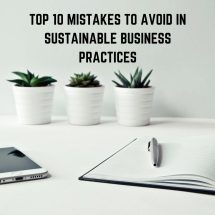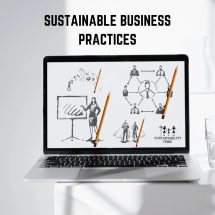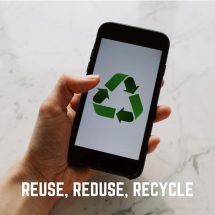
While working as a sustainability consultant and advisor to some local businesses, I came across many businesses over the years that make these very common mistakes when it comes to implementing sustainable business practices. Sometimes businesses have good intentions and even a good budget but because of these mistakes they fail to get success in implementing sustainability; this, in turn, leads to tarnishing the term ‘Sustainability’ in the perception of some business leaders and owners. So here is my list of top 10 mistakes to avoid in sustainable business practices.
1. Ignoring the basics of sustainable business practices
What are sustainable business practices really? Sustainable business practices once implemented can reduce an organization’s adverse impact on the environment and society without compromising profit factors. Sustainable business practices may include any actions or efforts which hit the triple bottom line that is people, planet, and profit. It can be going paperless or reducing waste in organization facilities & production facilities or it can be opting for clean energy or choosing nontoxic raw material for production or it can be providing employment to local indigenous people or anything else which can hit the triple bottom line. If any of the so-called sustainability efforts are not really reducing the adverse impact of the business, then those cannot be sustainable business practices. This simple rule of thumb is ignored sometimes.
2. Not having a sustainability policy
‘Sustainability’ needs to be implemented at the core of the business, by doing so the business can be made sustainable. Sustainability can be better implemented when the primary business activities & strategies are re-designed to incorporate environmental, social & economic sustainability. If any established business processes or practices are unsustainable and are leaving huge adverse impacts on society or the environment, then those processes or practices need to modify to reduce the adverse impact. If a business doesn’t have it yet, then a sustainability policy needs to be created to form sustainable business ethics & create the right principle of action for the business. Without such a sustainability policy, it’s hard for businesses or even their employees to implement sustainability efforts. A framework of sustainability commitments needs to be penned down.
3. Not having a sustainability implementation strategy
Once the sustainability policy is in place, a long and short-term sustainability strategy needs to be created, which can be modified as time goes by but without such strategy, it becomes difficult for businesses to create a plan of action. There are a variety of ways of creating a sustainability strategy. Organizations can get as creative and innovative in reducing their impact on the environment and society. It’s better to create a short and long-term sustainability strategy and start implementing it in phases. Businesses can also use Sustainable Development Goals (SDGs) a framework created by the United Nations and based on it create a sustainability strategy. Once implemented sustainable business practices need to be continual and can be improved based on measurable results.
4. Not being practical
When it comes to sustainable business strategy or efforts, they need to be practical, implementable as well as measurable. The practices which don’t contribute to business or profits tend to be automatically discontinued. Many times, businesses unnecessarily connect sustainability and innovation and try to compulsively achieve sustainability through innovation. It doesn’t mean that a business should stay away from innovation. But many times thinking out of the box and implementing simple innovative changes are an outcome of being more result-oriented.
5. Confusing CSR and Sustainability
Many times sustainability is confused with CSR (corporate social responsibility). There are two significant differences between sustainability and CSR. Firstly, sustainability needs to be implemented at the core of business whereas CSR goals and activities can be totally different than core business activities. Secondly, sustainability needs to be long-term as against CSR goals can be and are generally short-term goals. But if sustainability is implemented only on a short-term basis; it basically defeats the purpose; this way business gets restrictions on moving on to become a sustainable business.
6. Forgetting sustainable communication
This one is overlooked by many sustainable businesses, where they don’t feel the need of investing in sustainable communication, but if you don’t take efforts to convey to your clients about your sustainable efforts how they will come to know why your products and services are more sustainable. There has to be external as well as internal sustainability communication for any organization which is taking efforts towards sustainability. The employees should get to know better about practicing sustainability policies or actions planned and implemented by that business. The employees can also act as sustainability advocates of those organizations. To read my more dedicated article about the Need for sustainability communication in the Middle East published in Ecomena.
7. Expecting results overnight
It’s unfair to expect the results of sustainable business practices overnight. It goes the same way when it comes to implementing sustainable business practices, how it takes time for doing things right, it also takes time to see the good results. It’s not an overnight process. A business needs to build its own sustainable practices based on what suits its market and clients, slowly but surely results follow if enough time is allowed.
8. Investing in low impact measures
This is another very common mistake, where businesses in the hope of short-term gain, invest time, effort, and budget in the low impact measures. Ideally, before deciding on a sustainable action plan, an assessment, of how the actual adverse impact on the environment and society is reduced, is necessary. This helps to find high and low impact measures, based on which a sustainable action plan can be decided. But many businesses, rush to implement a not well-thought sustainability strategy and later blame that sustainability as a costly affair with no results.
9. No involvement from the right people of the organization
To further elaborate the last point of investing in low impact measures, it is always seen that the task of creating a sustainability strategy of a business is often outsourced or given to a small specialist team. But if the right people in the organization are not involved in creating a sustainable action plan, how can the business become a sustainable business? The smaller specialist teams or third parties do not have enough knowledge about your business processes, business workflow or supply chain, etc., so they end up suggesting some standard or common sustainability practices which might not be suited for your business. So ideally right people with the right knowledge from your organization should be involved in the process of creating a sustainable action plan, their feedback is important for decision making when it comes to implementing sustainability in your business.
10. ‘Greenwashing’ sustainability through marketing
It is most important to remember that sustainable business practices are not part of only a marketing strategy but part of a business strategy. If this is forgotten, then even un-intentionally, a business can get green-washed. Read here what is Greenwashing? What harm does greenwashing do to your business? Greenwashing questions the credibility of a business, which any business takes years to build. Remember how Coca-Cola was thrashed for its ‘green coco-cola campaign? Many people came to know about their unsustainable activities like water mining, because of outrage in media, which caused this campaign to fail. If a business is using sustainability business practices wording only to market their goods or services without implementing them at all or fully then it is called ‘greenwashing’, in short, fake sustainability. So, it’s important to train your marketing team, not to overestimate or exaggerate your sustainable business practices so much that it can end up counting as greenwashing.

Since the rising popularity of Sustainable Development Goals (SDGs) worldwide; some companies even opt for SDG-washing. In short use convenient SDGs only for the purpose of documentation or marketing instead of utilizing them for bringing an actual change in the organization. If you are keen to learn the necessary steps involved in SDG reporting of a business, access our 30-min short course, SDG Reporting Simplified. This course is designed to provide an introduction, pathway, and step-by-step guidelines about SDG Reporting.
Last year Dubai water and electricity authority and Road and transport authority announced incentives for using electric vehicles in UAE like free public parking & exemption from Salik toll. This is a great example of implementing sustainability on a government policy level to provide a push for more sustainable options. Dubai’s sustainability commitment can be seen on many levels and it is helping businesses to opt for more and more sustainable business practices. Expo 2020 has sustainability as one of the core themes along with innovation which is bringing many innovators and businesses to UAE from around the world in addition to a local pool of talent who have sustainable business practices implemented in their business or innovation.

Making Dubai green building regulations mandatory to obtain a permit for new construction is another great example of how businesses are directed towards sustainable practices and it has a significant impact in terms of sustainability. What could be a better model of implementing sustainability at the core than a country like UAE who has an oil-based economy is committed to the United Nation’s sustainable development goals by targeting 25% of energy from renewable sources by 2030.
After reading this article, if you think you are doing any of these mistakes and want to improve; then Sustainability Tribe can help you. We offer sustainability consulting and capacity-building services to businesses via our consulting arm AK Sustainability Advisory and help businesses in creating and implementing sustainability KPIs.

